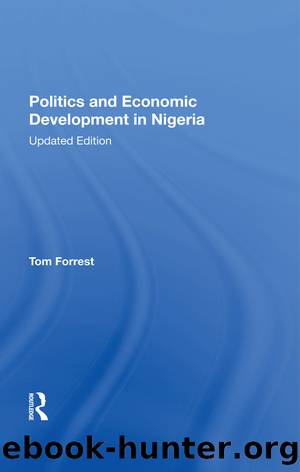Politics and Economic Development in Nigeria by Tom Forrest

Author:Tom Forrest [Forrest, Tom]
Language: eng
Format: epub
ISBN: 9780367283629
Google: wYQrzQEACAAJ
Goodreads: 50484220
Publisher: Routledge
Published: 2019-01-07T00:00:00+00:00
The Oil Boom and the Loss of Control, 1974â1977
The oil price rise of 1973â1974 brought an enormous expansion of state revenues. This increase was quickly translated into massive state expenditures, which maintained their momentum well after state revenues had declined. In general, economic policy was passive and took the line of least resistance. There were cuts in taxes and large salary and wage awards, and the naira was appreciated relative to foreign currencies.
Nigeria did not, like the low-population oil producers of the Middle East, invest its oil wealth in Western economies and thereby secure a flow of investment income for the future. Nor was revenue set aside in a stabilisation, or development, fund. Yet there was some outflow of capital on public account, which peaked in 1975â1976, plus a modest aid programme. Nigeria lent N225 million to the IMF oil facility, $80 million to the African Development Bank, and $52 million to the OPEC special fund.14 The aid programme included small sums to drought-affected states, grants to some countries in West Africa related to ECOWAS diplomacy, and a cash donation of N13.5 million to Angola in 1976.
The pressure of aggregate demand contributed to inflationary pressures that at their peak gave an official annual rate of inflation of 34 percent in 1975. In 1975 alone, there was a rise of N2.6 billion in aggregate demand attributable to the federal government.15 GDP over 1974â1977 grew at an annual average rate of 7.0 percent in real terms.
The result of the large increase in government expenditure was an explosion of purchasing power that ignited an enormous consumption boom. Some of this income flowed down no matter how successful the elites were in bringing about a one-sided division of the spoils. The 1974 and 1975 budgets were the great consumption budgets. Both budgets saw substantial falls in import duties and excises and a further relaxation of foreign exchange controls. It was government policy to control inflation by increasing the volume of imports. Import volume increased by 62 percent in 1975 and 38 percent in 1976.16
Table 7.3 Federal Government Finances, 1970â1993 (N million)
Download
This site does not store any files on its server. We only index and link to content provided by other sites. Please contact the content providers to delete copyright contents if any and email us, we'll remove relevant links or contents immediately.
Man-made Catastrophes and Risk Information Concealment by Dmitry Chernov & Didier Sornette(6011)
The Revenge of Geography: What the Map Tells Us About Coming Conflicts and the Battle Against Fate by Kaplan Robert D(4076)
Zero Waste Home by Bea Johnson(3835)
COSMOS by Carl Sagan(3618)
Good by S. Walden(3549)
In a Sunburned Country by Bill Bryson(3537)
The Fate of Rome: Climate, Disease, and the End of an Empire (The Princeton History of the Ancient World) by Kyle Harper(3062)
A Wilder Time by William E. Glassley(2859)
Camino Island by John Grisham(2797)
Organic Mushroom Farming and Mycoremediation by Tradd Cotter(2689)
The Ogre by Doug Scott(2679)
Human Dynamics Research in Smart and Connected Communities by Shih-Lung Shaw & Daniel Sui(2500)
Energy Myths and Realities by Vaclav Smil(2489)
The Traveler's Gift by Andy Andrews(2460)
9781803241661-PYTHON FOR ARCGIS PRO by Unknown(2365)
Inside the Middle East by Avi Melamed(2352)
Birds of New Guinea by Pratt Thane K.; Beehler Bruce M.; Anderton John C(2254)
A History of Warfare by John Keegan(2240)
And the Band Played On by Randy Shilts(2201)
